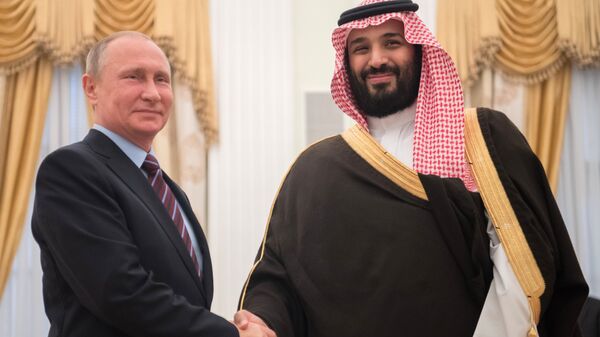Russia continues to strengthen its position as the main negotiator and mediator in the Middle East whose position Saudi Arabia and other Persian Gulf monarchies have to take in account, Gevorg Mirzayan, associate professor at the department of political science at the Finance University of the Russian Government, writes for RIA Novosti.
While the defeat of Daesh (ISIS/ISIL) in Syria has become just a matter of time the upcoming negotiation process has acquired a new meaning in the eyes of all the parties concerned.
According to Mirzayan, the Syrian opposition and Bashar al-Assad have six months — while de-escalation zones in Syria remain in place — to reach a mutually acceptable compromise.
"Moscow intends to involve the countries of the Persian Gulf to resolve this puzzle," Mirzayan writes. "Negotiations about the functioning of the southern zone of de-escalation were [previously] held with Jordan. But a special role in this combination is played by the Saudis."
However, it appears that Riyadh has recently decided to follow in Turkey's footsteps and give up the plan of ousting the Syrian president by military force, embracing the idea of political negotiations.
Therefore, Mirzayan continues, Saudi Arabia has signaled its willingness to hold talks with Russia over the Syrian crisis. Furthermore, either Saudi King Salman or his heir, Crown Prince Mohammad bin Salman, is due to visit Moscow soon, the academic highlights.
According to Mirzayan, at the core of Riyadh's initiative lies the Saudi leadership's desire to maintain a certain influence over Syrian affairs. In exchange Riyadh is ready to bring Syrian rebel groups under its control to the negotiating table. Furthermore, it appears that Saudi Arabia will not only consolidate the opposition groups, but will also bear the responsibility for the negotiating process, the academic remarks.
Riyadh's goals are clear: By preserving its influence in postwar Syria, Saudi Arabia is seeking to somehow limit Tehran's dominance in the region.
Still, Idlib remains the most problematic issue ahead of the talks: the crux of the matter is that the region is being claimed by both pro-Turkish and pro-Saudi Islamist groups, Mirzayan points out.
According to the academic, Riyadh continues to maintain control over al-Qaeda affiliate al-Nusra Front, which currently constitutes the core of the Hayat Tahrir al-Sham (HTS) or "Assembly for Liberation of the Levant" militant group. The terrorist organization managed to expel the Turkish-backed Ahrar al-Sham from key positions in Idlib province in July. Now the two are competing for the region.
However, it is highly unlikely that Moscow will agree to that, the academic highlights: "The Kremlin rightly continues to consider al-Nusra Front a terrorist organization and criticizes all those who cooperate with it."
On Monday, Russian Foreign Minister Sergei Lavrov lambasted Washington for covertly protecting the al-Nusra Front, stressing that the situation around the terrorist organization remains "very ambiguous."
"They [the US] did not have the spirit or the courage or the ability… to dissociate Jabhat al-Nusra from those oppositionists [of Syria] with which the US side cooperated…. This is absolutely unacceptable," Lavrov said following talks with the Jordanian foreign minister.
The al-Nusra Front is a Salafist jihadist organization, which was formed in 2012 as an affiliate of al-Qaeda and branded by some US mainstream media sources as "the most aggressive and successful arm of the rebel force."
However, in 2014 the al-Qaeda affiliate was included in the list of US terrorist organizations and designated a terrorist organization by the UN and the number of countries. Although the al-Nusra Front announced its rebranding and separation from al-Qaeda in 2016, the news was received with skepticism by the international community.






